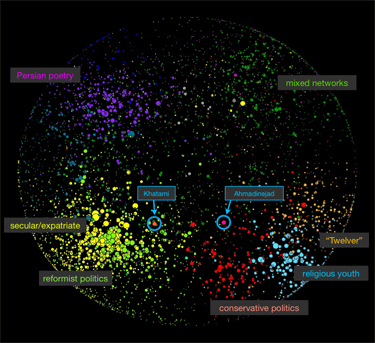A new study by the Berkman Center for Internet and Society opens with the following narrative:
Iran, a country rich in history, culture, and education, supports a large online community, including perhaps the fourth largest ‘blogosphere’ in the world (or the second, third or seventh). Because the Iranian press is under the control of religious conservatives who sit above elected officials in Iran’s peculiar hybrid political system, and because that conservative control is used to silence dissent, Iranians who think differently go online to express their views. Here, the inherent freedom of the Internet (anonymity, decentralized control, etc.) allows the true minds of Iran’s youth, journalists, and intellectuals to be known publicly. In their blogs and online chats we see their rejection of the regime, its brutal paternalistic control, its enforcement of archaic sexual mores, its corruption and incompetence, and of the legitimacy of the Islamic Republic itself. The government, worried, has cracked down. Bloggers have been sent to jail, websites are being blocked, and user bandwidth is constricted, but the Internet continues to be one of the best hopes for homegrown democratic change in autocratic Iran. If you read Iranian blogs, it is clear that many Iranians want drastic social and political change.
The authors of the paper then do the homework to ask if this story is true. And it is true– but so is a story about social and religious conservatives using the internet, or a story about the many sites devoted to Persian poetry and literature. Part of the confusion here is that we have, in the West, our own story about what it means to be liberal, freedom-loving, democratic, as contrasted with closed, repressive, backwards. Our ideas about the social and political struggles of Iranians do not map neatly to reality.
John Kelly and Bruce Etling actually did the work, looking at the whole blogosphere and not just the celebrated examples. The web was crawled; all Persian-language blogs were identified and their entries were captured over a period of seven months, and network analysis was performed on links both between the blogs and outside into the greater internet. Simultaneously, Persian speakers read each site and reported on the main topic of discussion, whether or not the poster wrote anonymously, the age of the author if it could be determined, and other variables. After all this,
If the Iranian blogosphere is a place where women speak out for their rights, young people criticize the moral police, journalists fight against censorship, reformists press for change, and dissidents press for revolution, it is also a place where the Supreme Leader is praised, the Holocaust denied, the Islamic Revolution defended, Hezbollah celebrated, Islamist student groups mobilized, and pro-establishment leaders, including President Ahmadinejad, reach out to their very real constituencies within the Iranian public. Furthermore, a great deal of the discourse in the Iranian blogosphere has little to do with an outside observer’s preconceived list of key issues.
There are many surprises here. Conservatives bloggers are more likely to write anonymously than reformists, and are younger on average. Religion is widely discussed, but mostly as religion and not politics. Gas subsidies are at least as hot a topic as proper women’s dress. And something like 20% of all blogs are concerned with poetry.
The paper authors also cross-reference their map to data from the OpenNet Initiative, which systematically tracks government censorship of web sites. Yes, there is state censorship, yes, bloggers have been arrested,
and yet Iran is not a garden-variety authoritarian state. Power is not perfectly concentrated, but exists in a number of often competing institutions. Elections are contested and have real
consequences, even if who is allowed to compete is tightly controlled. Despite conservative control of the press, criticism of government policies and officials is widespread, often from competing members of the establishment itself as well as what opposition is tolerated. Amid the repression in Iran, there is a great deal of contentious public discourse about politics, at least in the Iranian blogosphere.
This study is a shining example of actually, you know, going out into the world and looking. Iran and Islam and Freedom are topics both loaded and ambiguous, the stuff of talk-show hosts dreams. It’s easy and fun to argue endlessly about what turns out to be your own preconceptions, your own way of seeing the world and not theirs. But this is has little to do with reality, and I’m terribly, terribly that glad someone decided to peek outside the castle walls.
If, thanks to widespread satellite television and the occasional short-lived newspaper, conservative clerics lack a total monopoly on one-to-many mass media, even less do political reformists and modern-minded youth have a stranglehold on the Iranian blogosphere. This is why the story about Iranian online discourse usually reported in the West is so inadequate. Perhaps the most remarkable thing about the larger network of bloggers is its sheer diversity. As in the American blogosphere, the cartoonishly simple portrayal of political attitudes and human characters found in mass media fade in the face of the complex variety of real human voices. Our imagined enemies are not always the cardboard villains we assume them to be, and our imagined allies are not always the freedom-loving liberals we read about. There are clerics who favor relations with the West, and secularists who favor the enrichment of uranium. The Iranian blogosphere features thousands of politically attentive individuals, commenting on every imaginable issue, with a breadth of perspectives
For more on this startlingly informative study, see here.

2 thoughts on “Iranian Bloggers Fail to Live up to Stereotypes”